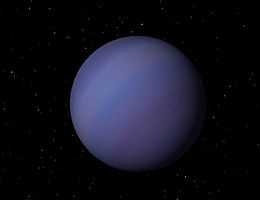83 Leonis Bb
| Extrasolar planet | List of extrasolar planets | |
|---|---|---|
| Parent star | ||
| Star | 83 Leonis B | |
| Constellation | Leo | |
| Right ascension | (α) | 11h 26m 45.32s |
| Declination | (δ) | +3° 0′ 47.18″ |
| Distance | 57.61 ly (17.67 pc) | |
| Spectral type | K2V | |
| Orbital elements | ||
| Semimajor axis | (a) | 0.12186 ± 0.00002[1] AU |
| Eccentricity | (e) | 0.13 ± 0.07[1] |
| Orbital period | (P) | 17.054 ± 0.003[1] d |
| Argument of periastron |
(ω) | 196 ± 32[1]° |
| Time of periastron | (T0) | 2,450,449 ± 2[1] JD |
| Semi-amplitude | (K) | 7.9 ± 0.6[1] m/s |
| Physical characteristics | ||
| Minimum mass | (m sin i) | 0.087 ± 0.006[1] MJ |
| Discovery information | ||
| Discovery date | 25 January 2005 | |
| Discoverer(s) | Marcy, Butler, Vogt et al. | |
| Discovery method | Doppler spectroscopy | |
| Discovery site | ||
| Discovery status | Confirmed | |
| Other designations | ||
| HD 99492 b | ||
| Database references | ||
| Extrasolar Planets Encyclopaedia | data | |
| SIMBAD | data | |
| Exoplanet Archive | data | |
| Open Exoplanet Catalogue | data | |

83 Leonis Bb (Celestia)
83 Leonis Bb, also catalogued as HD 99492 b or abbreviated 83 Leo Bb, is an extrasolar planet approximately 58 light-years away in the constellation of Leo (the Lion). The planet was discovered in January 2005 by the California and Carnegie Planet Search team, who use the Doppler spectroscopy method to detect planets.[2] It orbits in a close orbit around the star, completing one orbit in about 17 days.[1]
References
- ↑ 1.0 1.1 1.2 1.3 1.4 1.5 1.6 1.7 Stefano Meschiari, Gregory Laughlin, Steven S. Vogt, R. Paul Butler, Eugenio J. Rivera, Nader Haghighipour, Peter Jalowiczor (February 2011). "The Lick-Carnegie Survey: Four New Exoplanet Candidates". The Astrophysical Journal 727 (2): 117. arXiv:1011.4068. Bibcode:2011ApJ...727..117M. doi:10.1088/0004-637X/727/2/117.
- ↑ Marcy, Geoffrey W. et al. (January 2005). "Five New Extrasolar Planets". The Astrophysical Journal 619 (1): 570–584. Bibcode:2005ApJ...619..570M. doi:10.1086/426384.
External links
- "83 Leonis AB". SolStation. Archived from the original on 25 July 2008. Retrieved 2008-06-20.
- "Notes for planet HD 99492 b". The Extrasolar Planets Encyclopaedia. Retrieved 2008-06-20.
Coordinates: ![]() 11h 26m 45.32s, +03° 00′ 47.18″
11h 26m 45.32s, +03° 00′ 47.18″
| ||||||||||||||||||||||||||||||||||||||||||||||||||||||||||||||||